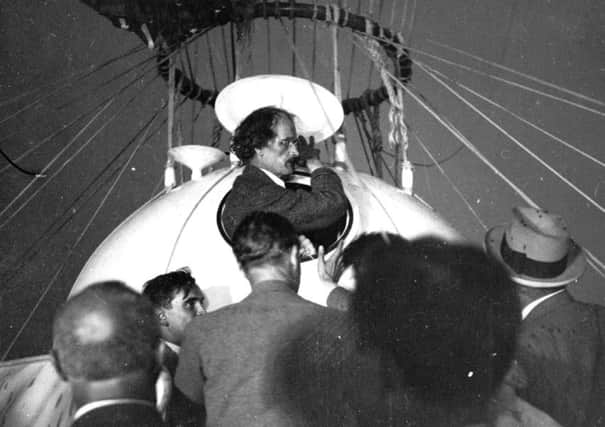On this day: Swiss duo become first men to reach stratosphere


585 BC: A timely total eclipse of the sun decided the Battle of Mesopotamia between Medes (now Iran) and Lydians (now Turkey). The blackened sky was read as a sign of God’s anger and an immediate truce was called.
1841: Seven ministers of the Presbytery of Strathbogie were deposed by the General Assembly of the Church of Scotland for obeying the civil rather than the ecclesiastical law.
Advertisement
Hide AdAdvertisement
Hide Ad1887: Seventy-three miners died in firedamp explosion at Udston Colliery, Lanarkshire.
1907: The first Isle of Man motor cycle TT race was held.
1931: Swiss professor Auguste Piccard and Charles Kipfer became first men to reach the stratosphere, ascending in their balloon to 52,462ft.
1934: The first Glyndebourne Festival of opera opened with Mozart’s Figaro.
1940: Belgian King Leopold III surrendered to Germany.
1967: Francis Chichester arrived back at Plymouth after sailing round the world single-handed in Gipsy Moth IV.
1982: Pope John Paul II arrived at Gatwick Airport – the first reigning Pope to visit Britain.
1982: A youth was jailed for 12 years for rape at the end of Scotland’s first private prosecution since 1909.
1982: Paratroopers recaptured Goose Green and Darwin in Falklands conflict, taking 1,400 Argentine prisoners. They lost 17 men, including Lieutenant-Colonel H Jones, commanding officer.
1990: President Saddam Hussein of Iraq gave warning that he would use nuclear weapons against Israel in the event of an Israeli attack on any Arab country.
Advertisement
Hide AdAdvertisement
Hide Ad1990: First all-woman crew to race round the world crossed the Whitbread Round the World Race Southampton finishing line in their yacht, Maiden.
1991: Ethiopian People’s Revolutionary Democratic Front took power in Addis Ababa as civil war ended.
1993: Nurse Beverley Allitt was given 13 life sentences for murdering four children and attacking others in her care.
1995: Serb forces took hostage more than 350 United Nations peace-keeping personnel, including 33 Britons, and used them as human shields against attacks on their weapon supplies.
2002: Nato declared Russia a limited partner in the Western alliance.
2002: The Mars Odyssey found signs of large ice deposits on Mars.
2003: Peter Hollingworth became the first governor-general of Australia to resign his office as a result of criticism of his conduct.
2004: The Iraqi Governing Council chose Ayad Allawi, a long-time anti-Saddam Hussein exile, as prime minister of Iraq’s interim government.
Advertisement
Hide AdAdvertisement
Hide Ad2008: More than 100 countries, including Britain, agreed to scrap their stocks of cluster bombs. The United States refused to take part.
2010: In West Bengal, India, a train derailment and subsequent collision killed 141 passengers.
Births: 1738 Joseph Guillotin, French physician who advocated use of beheading machine; 1759 William Pitt the Younger, prime minister; 1779 Thomas Moore, Irish poet and musician; 1818 Pierre Beauregard, American Confederate general; 1908 Ian Fleming, novelist who created “James Bond”; 1911 Dame Thora Hird, actress; 1940 Maeve Binchy, Irish novelist.
Deaths: 1849 Anne Brontë, novelist (notably The Tenant of Wildfell Hall); 1937 Alfred Adler, psychiatrist and psychologist; 1972 Duke of Windsor, the abdicated King Edward VIII; 1984 Eric Morecambe, comedian; 1995 Jean Muir, dress designer; 2009 Terence Alexander, English film and television actor; 2010 Gary Coleman, American actor; 2014 Maya Angelou, author, poet, actress, singer, civil rights activist; 2015 Johnny Keating, Edinburgh-born musician, composer.